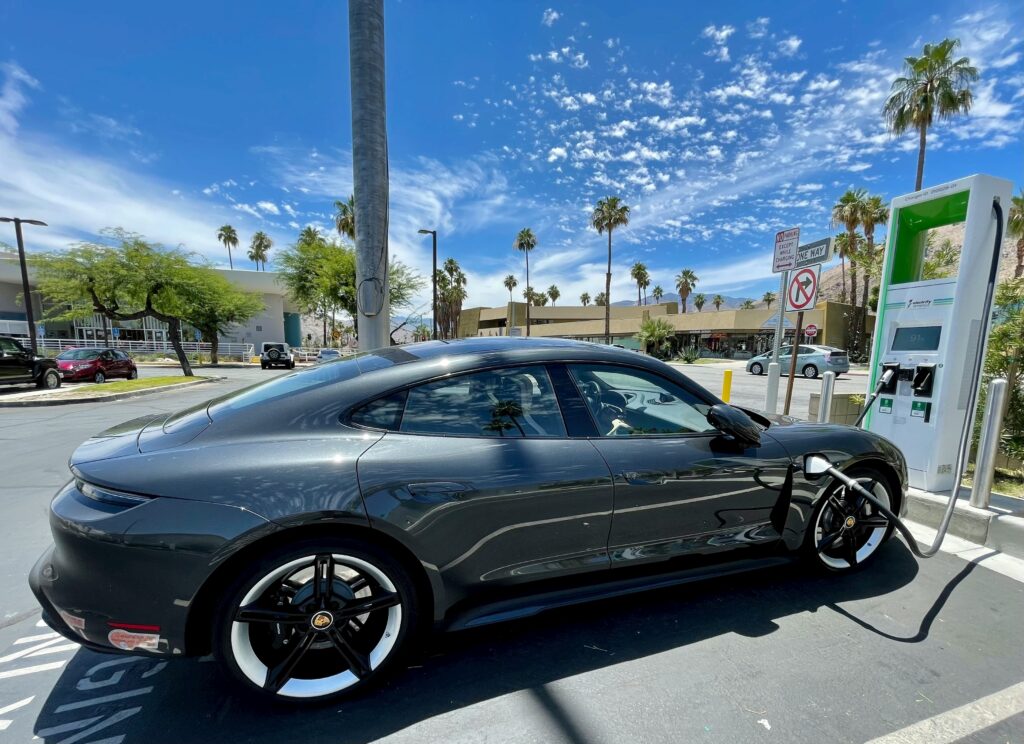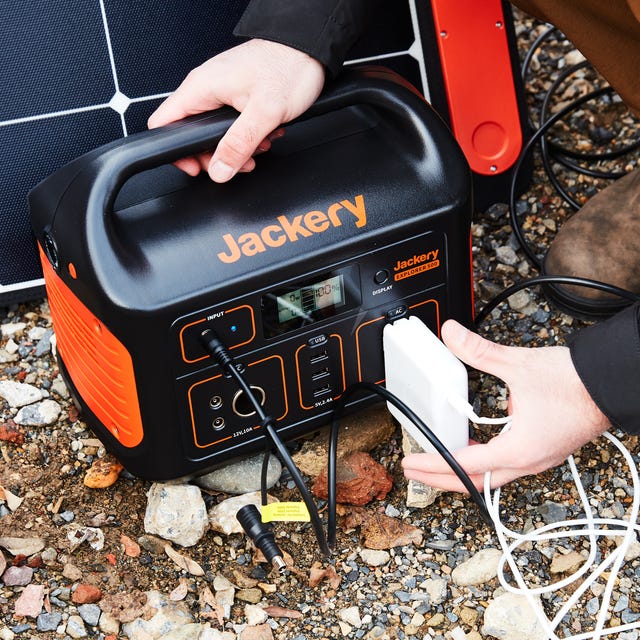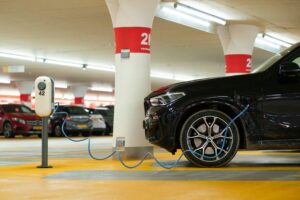Yes, you can charge a portable power station with a gas generator. Portable power stations often have various inputs, including DC input, which allows you to charge them using a gas generator.

Portable power stations are versatile and convenient solutions for powering outdoor activities, emergency situations, or off-grid living. They come in different sizes and capacities, and can be charged using various methods, including solar panels, AC power from traditional outlets, or DC power from a gas generator.
This makes them a reliable source of power for camping, hiking, tailgating, or as an emergency backup during power outages. We will explore how you can effectively charge a portable power station using a gas generator, providing you with the necessary information to make the most of your portable power solution.

Credit: www.popularmechanics.com
Understanding Portable Power Stations
Function: Portable power stations, also known as portable power banks or generators, are compact devices designed to store electrical energy and provide on-the-go power for various electronic devices and appliances. They typically contain a rechargeable battery, input ports for recharging, and output ports for powering or charging devices.
Features:
-
Power Capacity: Portable power stations come in various capacities, ranging from small units suitable for charging smartphones to larger models capable of powering laptops, refrigerators, or even small appliances during power outages or outdoor activities.
-
Output Ports: They feature multiple output ports, such as AC outlets, DC ports, USB ports, and sometimes even wireless charging pads, allowing users to connect and power different devices simultaneously.
-
Recharge Methods: Portable power stations can be recharged using different methods, including AC wall outlets, solar panels, car adapters, or generators, providing versatility and convenience for charging in various environments.
-
Safety Features: Many portable power stations are equipped with safety features like overcharge protection, short circuit protection, and temperature control mechanisms to ensure safe and reliable operation.
-
Portability: Designed for mobility, portable power stations often feature compact and lightweight designs, with built-in handles or carrying straps for easy transportation.
-
Durability: They are typically built to withstand outdoor use and harsh conditions, with rugged construction and weather-resistant materials.
Applications:
-
Outdoor Activities: Portable power stations are commonly used for camping, hiking, boating, and other outdoor activities to power lights, fans, portable refrigerators, and electronic devices.
-
Emergency Preparedness: They serve as reliable backup power sources during power outages or emergencies, allowing users to keep essential devices like lights, radios, and communication devices operational.
-
Remote Work: With the increasing trend of remote work, portable power stations are handy for powering laptops, monitors, routers, and other work-from-home equipment, especially in areas with unreliable electricity supply.
-
Recreational Vehicles (RVs) and Boats: Portable power stations are useful for providing electricity in RVs, camper vans, and boats, powering appliances, entertainment systems, and charging devices while on the move.
-
Construction Sites: They can be used on construction sites to power tools, lighting, and other equipment without access to traditional power outlets.
Portable power stations have become an essential companion for outdoor enthusiasts, emergency preparedness, and off-grid living. This revolutionary technology allows you to harness electricity wherever you go, providing you with the convenience of powering your devices away from traditional power sources. In this article, we will dive into the world of portable power stations, exploring what they are, how they work, and most importantly, whether you can charge them with a gas generator.
What Is A Portable Power Station?
A portable power station, also known as a portable generator or a portable battery pack, is a compact and versatile device that stores electrical energy for later use. Unlike traditional gas generators that burn fuel to generate power, portable power stations rely on lithium-ion batteries to store power. These all-in-one units typically feature multiple AC outlets, USB ports, and DC outputs, allowing you to charge and power various devices simultaneously.
How Does A Portable Power Station Work?
Portable power stations work by storing electrical energy in a rechargeable lithium-ion battery pack. When connected to a power source, such as a wall outlet or a solar panel, the battery pack charges up, storing electricity for later use. Once charged, you can plug in your devices and draw power from the portable power station as needed. This technology offers a safe and clean alternative to traditional gas generators, producing minimal noise and zero harmful emissions.
When it comes to recharging a portable power station, there are multiple options available. Typically, you can charge these units using a standard wall outlet, a car’s 12V adapter, or a solar panel. However, you may be wondering whether it is possible to charge a portable power station with a gas generator.
The answer is both yes and no. While it is technically possible to charge a portable power station with a gas generator, it is not the most efficient or environmentally friendly option. Gas generators are designed to produce electricity directly, making them more suitable for powering heavy-duty appliances or tools. In contrast, portable power stations are optimized for storing and discharging electricity, providing a reliable and portable power source for smaller devices.
Attempting to charge a portable power station with a gas generator may not only be inefficient but could also pose safety risks. The voltage and frequency from a gas generator may not match the requirements of the power station, potentially damaging the battery pack or the connected devices. Furthermore, running a gas generator to charge a portable power station defeats the purpose of using a clean and quiet power source.
In conclusion, while it may be possible to charge a portable power station with a gas generator, it is not recommended due to inefficiency, potential safety risks, and the environmental impact. Instead, opt for the recommended charging methods, such as a wall outlet, a car’s 12V adapter, or solar panels, to ensure the optimal performance and longevity of your portable power station.

Exploring Gas Generators
Function: Gas generators, also known as gasoline generators, are devices that convert the chemical energy stored in gasoline or diesel fuel into electrical energy. They consist of an internal combustion engine coupled with an alternator that generates electricity when the engine is running.
Features:
-
Power Output: Gas generators are available in various power output capacities, ranging from small portable units suitable for camping or powering household essentials during outages to large stationary generators capable of supplying backup power to entire homes or businesses.
-
Fuel Type: Gas generators primarily run on gasoline or diesel fuel, with gasoline being more common for smaller portable units and diesel for larger standby generators. Some models are dual-fuel, allowing operation with either gasoline or propane.
-
Starting Mechanism: Gas generators may feature manual recoil start mechanisms, electric start systems with push-button ignition, or even remote start capabilities for added convenience.
-
Output Ports: They typically include multiple outlets for connecting and powering various devices and appliances, such as household appliances, power tools, electronic devices, and RV or camping equipment.
-
Run Time: Gas generators have a specified run time, indicating how long they can operate continuously on a full tank of fuel at a certain load. Run times vary depending on the generator’s fuel efficiency, tank capacity, and load demand.
-
Portability: Portable gas generators often feature compact and lightweight designs, with built-in handles or wheels for easy transportation. Larger standby generators are stationary units installed permanently on a concrete pad.
Benefits:
-
Emergency Backup Power: Gas generators provide reliable backup power during power outages, ensuring essential appliances and devices remain operational, including lights, refrigerators, heaters, sump pumps, and medical equipment.
-
Versatility: Gas generators are versatile and can be used in various settings, including homes, construction sites, outdoor events, RVs, and remote locations without access to grid power.
-
Portability: Portable gas generators offer flexibility and convenience for camping, tailgating, outdoor recreational activities, and temporary power needs in remote areas.
-
Quick Start: Gas generators can be quickly started and provide immediate power, making them suitable for emergency situations or situations where a temporary power source is needed.
Considerations:
-
Fuel Availability: Gas generators require a steady supply of fuel, so it’s essential to have sufficient fuel reserves on hand, especially during emergencies or extended power outages.
-
Maintenance: Regular maintenance, including oil changes, air filter replacements, and spark plug inspections, is necessary to ensure optimal performance and longevity of the generator.
-
Noise Level: Gas generators can be noisy during operation, which may be a consideration for residential areas or camping sites with noise restrictions.
-
Emissions: Gas generators emit exhaust gases and noise during operation, so it’s important to place them in well-ventilated areas and follow safety guidelines to prevent carbon monoxide poisoning.
Gas generators are valuable tools that provide an essential source of energy for numerous applications, including camping, outdoor events, and emergency backup power. Understanding the fundamentals of gas generators is crucial for those considering their usage in conjunction with a portable power station.
What Is A Gas Generator?
A gas generator is a portable device that converts gasoline into electricity. Designed as a versatile power source, it offers a reliable solution for powering various electrical equipment and devices in situations where a traditional power source is unavailable, such as during power outages or in remote locations.
How Does A Gas Generator Work?
Gas generators operate via an internal combustion engine fueled by gasoline, converting the mechanical energy generated by the engine into electrical energy. The engine’s rotation triggers the production of electricity through an alternator, with the generated power available for use through the generator’s outlets.
Compatibility Of Portable Power Stations And Gas Generators
Portable power stations and gas generators serve as valuable sources of backup power and are often used in various settings, including homes, outdoor events, construction sites, and recreational activities. While they operate using different fuel sources and mechanisms, they can be compatible and complement each other in certain scenarios. Here’s an exploration of their compatibility:
1. Backup Power Synergy:
- Portable power stations and gas generators can work together to provide a robust backup power solution. Gas generators can serve as primary power sources during extended outages or high-demand situations, while portable power stations can act as secondary backup power sources to support critical devices and appliances or provide power in areas where the generator’s reach may be limited.
2. Versatile Power Options:
- Combining a gas generator with a portable power station offers versatility in power options. Gas generators provide high-capacity, continuous power for running heavy-duty appliances and equipment, while portable power stations offer flexibility and mobility for powering smaller devices, electronics, and sensitive equipment.
3. Redundancy and Reliability:
- Having both a gas generator and a portable power station ensures redundancy and reliability in backup power systems. In the event of a failure or maintenance issue with one system, the other can provide backup power, minimizing downtime and ensuring continuity of operations.
4. Fuel Diversification:
- By using both gas generators and portable power stations, users can diversify their fuel sources, reducing dependency on a single fuel type. This can be beneficial during fuel shortages, emergencies, or situations where one fuel source may be more readily available or cost-effective than the other.
5. Flexible Charging Options:
- Portable power stations can be recharged using various methods, including solar panels, AC wall outlets, car adapters, and generators. Gas generators can serve as a reliable and efficient means of recharging portable power stations, especially in off-grid or remote locations where access to traditional power sources may be limited.
6. Enhanced Mobility and Portability:
- Gas generators are typically stationary units installed in fixed locations, while portable power stations are designed for mobility and can be easily transported to different locations as needed. Combining the two allows users to enjoy the benefits of both stationary backup power and portable power solutions for on-the-go use.
When it comes to emergency power supply, portable power stations and gas generators are essential tools that offer reliable electricity during outages or outdoor activities. However, to ensure the effectiveness of these power sources, it’s crucial to understand their compatibility and how to utilize them appropriately.
Can You Charge A Portable Power Station With A Gas Generator?
Yes, you can charge a portable power station using a gas generator. Portable power stations can be recharged using various methods, including solar panels, wall outlets, and also a gas generator. This versatility makes them a practical power source for a wide range of situations, providing peace of mind when access to traditional electricity is limited.
Considerations For Connecting A Portable Power Station To A Gas Generator
When connecting a portable power station to a gas generator, there are a few key considerations to keep in mind to ensure safe and efficient operation. Here are some important points to consider:

Credit: www.evconnect.com
Benefits And Limitations Of Charging With A Gas Generator
Charging devices with a gas generator offers both benefits and limitations, depending on the specific situation and requirements. Here’s an overview:
Benefits:
-
Reliable Power Source: Gas generators provide a reliable source of power, especially during emergencies or power outages. They can supply continuous electricity to charge devices, run appliances, and power essential equipment when grid power is unavailable.
-
High Power Output: Gas generators typically offer high power output capacities, making them suitable for charging multiple devices simultaneously or powering high-demand appliances and equipment.
-
Versatility: Gas generators are versatile and can be used in various settings, including homes, construction sites, outdoor events, and remote locations. They provide flexibility in powering devices and appliances where traditional power sources are unavailable or impractical.
-
Quick Charging: Gas generators can quickly charge devices, providing immediate power when needed. This makes them valuable for emergency situations or when a temporary power source is required.
-
Extended Runtime: Gas generators have large fuel tanks that can provide extended runtime, allowing for continuous operation over extended periods without the need for frequent refueling.
Limitations:
-
Fuel Dependency: Gas generators rely on gasoline or diesel fuel, which may not always be readily available, especially during emergencies or natural disasters. Users need to ensure they have a sufficient fuel supply on hand to sustain the generator’s operation.
-
Noise and Emissions: Gas generators can be noisy during operation and emit exhaust gases, including carbon monoxide. This can be a concern, especially in residential areas or enclosed spaces, requiring proper ventilation and adherence to safety guidelines to prevent health risks.
-
Maintenance Requirements: Gas generators require regular maintenance, including oil changes, air filter replacements, and spark plug inspections, to ensure optimal performance and longevity. Neglecting maintenance can lead to decreased efficiency, reliability issues, and costly repairs.
-
Environmental Impact: Gas generators contribute to air and noise pollution, especially when used extensively or in densely populated areas. Minimizing their environmental impact requires proper fuel management, maintenance practices, and consideration of alternative power sources.
-
Cost of Operation: Operating a gas generator can be costly, considering expenses related to fuel, maintenance, and repairs. Users need to factor in these costs when evaluating the overall value and feasibility of using a gas generator for charging devices.
When it comes to charging a portable power station, using a gas generator can be a viable option. However, it is important to consider both the advantages and disadvantages of this method before deciding to go ahead. In this section, we will explore the benefits and limitations of charging with a gas generator.
Advantages Of Using A Gas Generator
Using a gas generator to charge a portable power station offers several benefits that make it a popular choice for many. The advantages include:
- Portability: Gas generators are compact and can be easily transported, making them convenient for outdoor activities or during power outages.
- Versatility: Gas generators can power various devices apart from charging power stations, such as electronics, appliances, or tools.
- Quick charging: Gas generators provide a fast charging experience, allowing you to recharge your power station in a relatively short amount of time.
- Extended runtime: With a gas generator, you can charge your power station multiple times before needing to refuel, providing a longer runtime for your devices.
Disadvantages Of Using A Gas Generator
While charging a portable power station with a gas generator has its advantages, it also comes with certain limitations that should be considered. Here are some of the disadvantages:
- Noisy: Gas generators tend to produce loud noises, which can be bothersome, especially in quiet environments or camping trips.
- Environmental impact: Gas generators emit exhaust fumes that contribute to air pollution and can be harmful to the environment.
- Expense: Gas generators require fuel to operate, which can become costly, especially during extended usage or frequent charging sessions.
- Maintenance: Gas generators need regular maintenance, including oil changes and filter replacements, to ensure optimal performance and longevity.
Considering these advantages and disadvantages, it is essential to assess your specific needs and circumstances before deciding if charging a portable power station with a gas generator is the right choice for you.
Alternative Charging Methods For Portable Power Stations
When it comes to keeping your portable power station charged, there are various alternative methods available. Whether you are camping in the wilderness or experiencing a power outage at home, knowing the different charging options for your portable power station can provide peace of mind and ensure you never run out of power when you need it the most.
Solar Charging
One of the most eco-friendly and convenient ways to charge your portable power station is through solar power. By harnessing the energy of the sun, you can replenish the battery of your power station wherever sunlight is available. Solar charging is especially beneficial for outdoor enthusiasts and off-grid adventurers who want to reduce their reliance on traditional power sources.
Here’s how you can charge your portable power station using solar power:
- Position your solar panels in direct sunlight. Ensure that there are no obstructions that could shade the panels and limit their efficiency.
- Connect the solar panels to your power station using the provided connectors and cables. Make sure the connections are secure to avoid any power loss.
- Monitor the charging progress through the power station’s display or app if available. It is essential to place the solar panels in optimal positions throughout the day to maximize the charging efficiency.
- Enjoy a continuous power supply from the sun, knowing that you are utilizing clean and renewable energy.
Ac Wall Outlet Charging
If you have access to a standard AC wall outlet, you can easily charge your portable power station without the need for additional equipment. This charging method is convenient for individuals who have the luxury of electricity at their disposal or for emergencies when other options are unavailable.
To charge your portable power station using an AC wall outlet:
- Locate an AC power outlet near your power station.
- Plug the power station’s charging cable into the AC wall outlet.
- Connect the other end of the charging cable to your power station. Ensure the connection is secure.
- Observe the charging progress on the power station’s display, and wait for it to reach full capacity.
- Enjoy the peace of mind of having a fully charged power station, ready to provide you with electrical power whenever you need it.
By utilizing either solar charging or AC wall outlet charging, you can keep your portable power station powered up and ready to go. Whether you’re exploring the great outdoors or preparing for unexpected power outages, these alternative charging methods ensure you never have to worry about running out of power again.

Credit: m.youtube.com
Frequently Asked Questions Of Can You Charge Portable Power Station With A Gas Generator
Can You Charge A Portable Power Station With A Gas Generator?
Yes, you can charge a portable power station with a gas generator. Gas generators are a reliable and convenient source of power for charging portable devices, providing a backup option for emergencies or outdoor activities.
How Does Charging A Portable Power Station With A Gas Generator Work?
Charging a portable power station with a gas generator is simple. You connect the power station to the generator using the appropriate cables or adapters. The generator’s power is then transferred to the power station, replenishing its battery for future use.
Are There Any Considerations When Charging A Portable Power Station With A Gas Generator?
Yes, there are a few considerations to keep in mind. Ensure that the gas generator’s power output is compatible with the power station’s requirements. Additionally, maintain proper ventilation and follow safety precautions while operating both the generator and power station to prevent any mishaps.
Conclusion
To summarize, while a gas generator can provide a reliable source of power for various applications, it is not compatible with charging a portable power station. The fundamental differences in their power generation mechanisms make it impractical and potentially unsafe to connect them together.
It’s important to understand the specific requirements and limitations of each device to ensure proper usage and avoid any potential damage or risk.